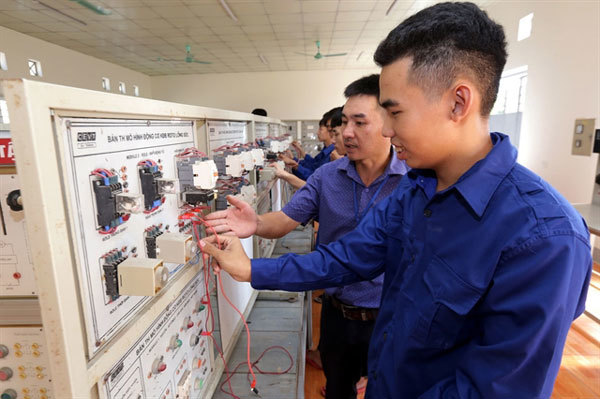Deputy Minister of Agriculture and Rural Development Tran Thanh Nam, speaking at a workshop on mechanization and the processing industry in June, said that tractor drivers also should be licensed.

There is a high demand for skilfull labourers, graduated from immediate and long-term training courses to serve the economic development.
Nam said that officials of other countries who visit Vietnam to examine local production conditions before accepting farm imports from Vietnam, pay attention to labor safety. But Vietnamese businesses don’t attach much importance to the issue.
“Vietnamese drivers of plowing machines and combine harvesters still have not been standardized. In the future, they need to be well-trained, and obtain licenses to practice using the machines,” Nam said. “Car drivers have to have driving licenses, and so should plow drivers."
| In order to mechanize agriculture, Vietnam needs to have skilled labor force, experts say. Many workers in agricultural production need to be trained or should obtain degrees. |
“Agricultural machine operators must be equipped with labor protection equipment and clothing. They must not drive machines wearing shorts,” he said.
Dr Nguyen Van Khai from the Can Tho University said people die every year because of accidents when using agricultural machines.
Khai He said that in the immediate time, training courses about the stages of agricultural mechanization, such as soil preparation, planting and harvesting, are needed.
In the long term, provincial vocational centers need to send people with mechanical engineering knowledge to universities, where they can be equipped with knowledge about modern agricultural production.
According to Pham Van Tan, deputy director of the Sub-Institute of Agricultural Engineering and Post-Harvest Technology, the agricultural mechanization plan 30 years ago could not succeed because of the abundant labor force. However, as industry and service have developed strongly and the labor force in agriculture is now smaller and labor costs have risen, mechanization is inevitable.
Nguyen Huy Bich from the HCM City University of Agriculture and Forestry said other countries all have policies to encourage mechanization if they want to develop agriculture.
The South Korean government, for example, encouraged farmers to mechanize by supporting 40 percent of the total value of plowing machines and provided loans for the remaining 60 percent.
Local newspapers quoted Nguyen Dac Hung, head of Vocational Education and Training Department under the Party Central Committee's Commission for Publicity and Education as saying that at least 30 percent of graduates from secondary school would need to learn in vocational schools by 2020 to meet labour market demand.
Chi Mai

Hanoi to open vocational training courses in craft villages this year
Hanoi has developed plans to open vocational training classes in traditional handicraft villages for 1,650 rural labourers this year.

International vocational training to be extended
Vocational training schools in Vietnam will continue to use curricula transferred from Australia and Germany until the end of 2020 and 2025, respectively, following the technical vocational education and training (TVET) reform plan.
 In order to mechanize agriculture, Vietnam needs to have skilled labor force, experts say. Many workers in agricultural production need to be trained or should obtain degrees.
In order to mechanize agriculture, Vietnam needs to have skilled labor force, experts say. Many workers in agricultural production need to be trained or should obtain degrees.